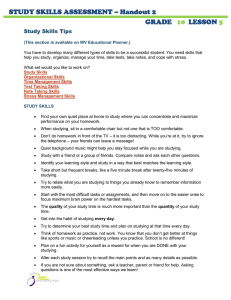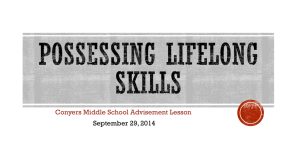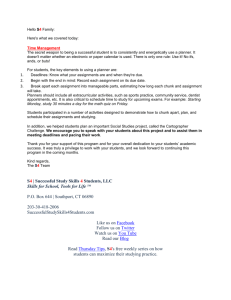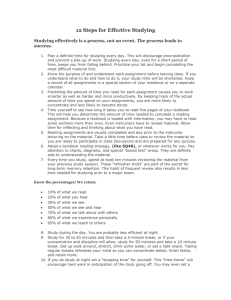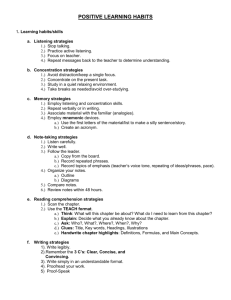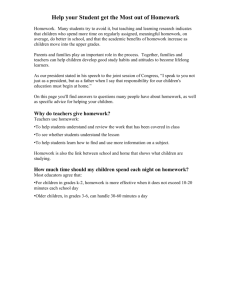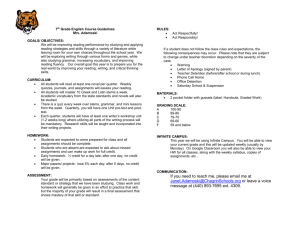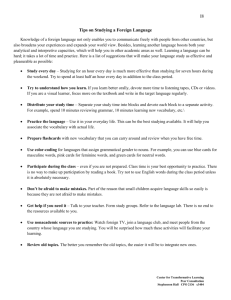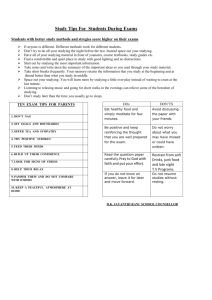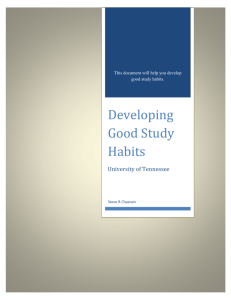Study Skills Tips
advertisement
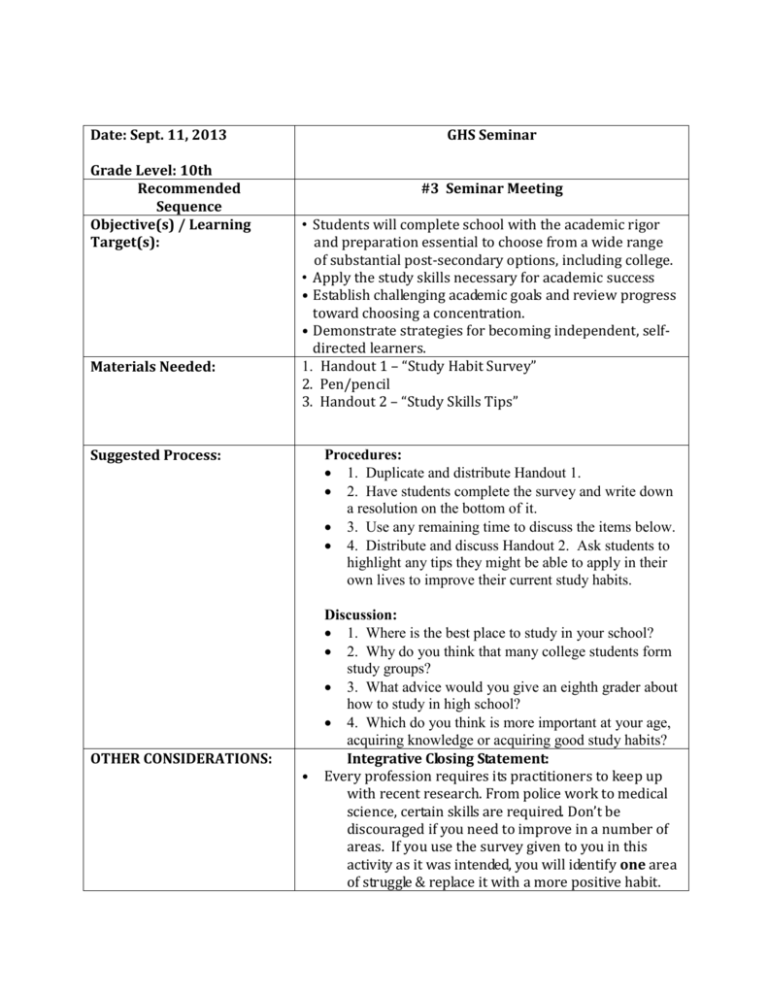
Date: Sept. 11, 2013 Grade Level: 10th Recommended Sequence Objective(s) / Learning Target(s): Materials Needed: GHS Seminar #3 Seminar Meeting • Students will complete school with the academic rigor and preparation essential to choose from a wide range of substantial post-secondary options, including college. • Apply the study skills necessary for academic success • Establish challenging academic goals and review progress toward choosing a concentration. • Demonstrate strategies for becoming independent, selfdirected learners. 1. Handout 1 – “Study Habit Survey” 2. Pen/pencil 3. Handout 2 – “Study Skills Tips” Suggested Process: Procedures: 1. Duplicate and distribute Handout 1. 2. Have students complete the survey and write down a resolution on the bottom of it. 3. Use any remaining time to discuss the items below. 4. Distribute and discuss Handout 2. Ask students to highlight any tips they might be able to apply in their own lives to improve their current study habits. OTHER CONSIDERATIONS: • Discussion: 1. Where is the best place to study in your school? 2. Why do you think that many college students form study groups? 3. What advice would you give an eighth grader about how to study in high school? 4. Which do you think is more important at your age, acquiring knowledge or acquiring good study habits? Integrative Closing Statement: Every profession requires its practitioners to keep up with recent research. From police work to medical science, certain skills are required. Don’t be discouraged if you need to improve in a number of areas. If you use the survey given to you in this activity as it was intended, you will identify one area of struggle & replace it with a more positive habit. Additional Resources: Effective Habits for Effective Studies: http://www.studygs.net/attmot4.htm Concentrating When Studying: http://www.studygs.net/concen.htm Extension Activities: Ask students to practice the study skills they have learned today in order to make them study habits. Activity: Have students review articles and links in Homework Help site on the GHS Counseling Website Study Habit Survey Read the items below and place a check mark by the ones that you think you need to improve upon or be more consistent with. Remember that you may check as many as you want. _____1. I have a study schedule. _____2. I have a quiet place to study. _____3. I write down my assignments daily. _____4. I prioritize and do the urgent assignments first. _____5. I take advantage of the tutoring programs and other opportunities for help in my school. _____6. I have a study buddy or study group. _____7. I am honest with myself about why I didn’t prepare well for a test. _____8. I use a method like SPQ3R or some other method when reading texts. _____9. I try to concentrate and take good notes. _____10. I rewrite my notes or reorganize them before a test. _____11. I have the fortitude to turn the TV off when I have to. _____12. I read my notes and I review the text before each test. _____13. I ask for clarification from teachers when I need it. _____14. I can work without distractions in the place that I usually study. _____15. I budget enough time each week to study well. The list above is not an exhaustive one. Reading it may remind you of something else that you can do to study better. In the space below write down one thing that you will concentrate on during the next few weeks in order to improve your ability to study. Copy it somewhere else in a notebook or day planner to remind yourself to follow through with it. __________________________________________________________________________________________ Study Skills Tips You have to develop many different types of skills to be a successful student. You need skills that help you study, organize, manage your time, take tests, take notes, and cope with stress. What set would you like to work on? STUDY SKILLS Find your own quiet place at home to study where you can concentrate and maximize performance on your homework. When studying, sit in a comfortable chair but not one that is TOO comfortable. Don’t do homework in front of the TV – it is too distracting. While you’re at it, try to ignore the telephone – your friends can leave a message! Quiet background music might help you stay focused while you are studying. Study with a friend or a group of friends. Compare notes and ask each other questions. Identify your learning style and study in a way that best matches the learning style. Take short but frequent breaks, like a five minute break after twenty-five minutes of studying. Try to relate what you are studying to things you already know to remember information more easily. Start with the most difficult tasks or assignments, and then move on to the easier ones to focus maximum brain power on the hardest tasks. The quality of your study time is much more important than the quantity of your study time. Get into the habit of studying every day. Try to determine your best study time and plan on studying at that time every day. Think of homework as practice, not work. You know that you don’t get better at things like sports or music or cheerleading unless you practice. School is no different! Plan on a fun activity for yourself as a reward for when you are DONE with your studying. After each study session try to recall the main points and as many details as possible. If you are not sure about something, ask a teacher, parent or friend for help. Asking questions is one of the most effective ways we learn! Plan to spend MORE time (not less time) on the subjects that are harder for you. ORGANIZATIONAL SKILLS Use things like outlines, charts, or flashcards to help you organize and learn new material. You’ll be reviewing the material while you are making these tools, and you’ll have them to use later when it’s time to study for tests. Use a planner to keep track of homework assignments, tests and projects. Write in your planner every single day so that it becomes a habit! Keep a notebook or folder for all your notes and homework assignments. You might need one for each subject to make things easier. Keep a "To Do" list. Write down things you need to do, then decide what needs to be done right away and what can wait until later. TIME MANAGEMENT SKILLS For each study period, decide what you want to accomplish and how long you will spend on each subject or assignment. Break your workload down into manageable chunks and take your homework one step at a time. Don’t procrastinate (that’s a big word that means putting things off). Give yourself plenty of time to get things done by planning ahead and sticking to a schedule. Be aware of things that distract you or waste your time, and keep them to a minimum. TEST TAKING SKILLS Be well rested before taking tests. Don’t cram for tests! It’s OK to spend extra time studying the night before a big test, but don’t try to learn EVERYTHING that night. Try to find out what type of test you will be taking (essay, multiple choice, True/ False, matching, etc.). It’s likely that test questions will be similar to homework you have done, because homework is "practice." DON’T PANIC. Just tackle one question at a time. If a question is too hard, skip it and come back to it later. NOTE TAKING SKILLS Don’t try to write down everything the teacher says. Focus on the main ideas. When you’re taking notes, use your own words. Keep your notes organized. They will be as important as the text book. Each night, review the notes you took that day. This will make things easier to remember when it comes time to study for the test. STRESS MANAGEMENT SKILLS Don’t sweat the small stuff. Try to prioritize your activities, and focus on the most important ones. Work off stress through some kind of physical activity. Exercise is a great stress reliever because it takes your mind off of things that are bothering you. Take care of yourself. Be sure to eat right and get enough sleep. Eating too much or too little, or sleeping too much or too little, can aggravate the stress that you already have.
